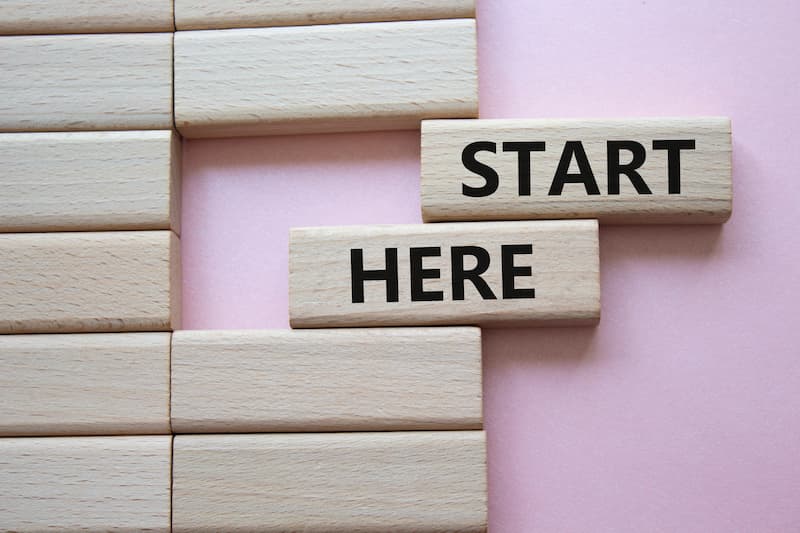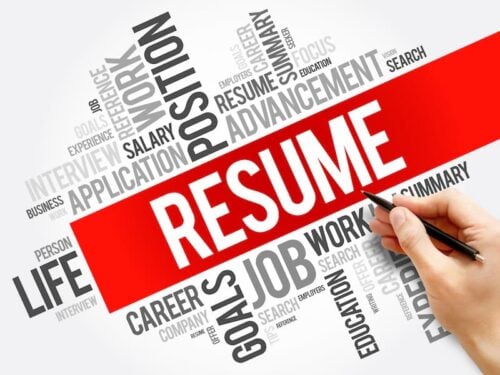You’ve got a blank document, a blinking cursor, and a mild sense of panic. You know you need a resume, but where the heck do you start? If you’re like most people, you might begin by listing your past jobs, copying a free template, or Googling “best resume format.” But here’s the thing: none of those should be the first step to writing your resume.
The smartest first step to writing your resume isn’t about fonts or formatting. It’s about focus. Before you type a single word, you need to know exactly what type of job you’re aiming for. Think of it like packing a suitcase: you wouldn’t throw things in at random and then ask where you’re going. The same goes for your resume. Start by defining your career destination, and then your resume will practically write itself!
Read on to learn more about the best first step to writing your resume, including tips based on specific career situations.
Best first step to writing your resume: A case study
I recently worked with a client I’ll call Jessica. Jessica hadn’t written a resume in over a decade. After years at home raising her kids, she was ready to reenter the workforce. However, staring at a blank page felt overwhelming to say the least! Instead of jumping straight into applying for any and every job opening she saw with one generic resume (which is the most common mistake I see job seekers make), I helped her take the best first step to writing your resume: getting clear on her career goal.
First, I sat down with Jessica and had her pinpoint the kind of job she wants, which she informed me is an administrative assistant in a school setting. Jessica was pretty clear on exactly what job she wanted, but many people are not. If you’re not sure what job you want, it’s important to clarify your most important personality traits, strengths, and interests. Also, take time to reflect on where you’ve been in terms of jobs you’ve had and what you liked and disliked about them.
Because Jessica had already figured out the job she was targeting, the second step was to have her do some research by browsing job boards and reading descriptions to understand what employers are looking for in her targeted roles. For homework, I had her write down common skills and keywords (like “calendar management,” “communication,” and “student support”) that appeared consistently in job postings.
Lastly, I helped Jessica reflect on her past experience, including volunteer work, managing her household, and previous jobs to identify relevant skills and achievements that she could highlight on her resume which were also directly relevant to her targeted jobs. With this clarity, Jessica no longer had to guess what to write, and she was easily able to align her resume with a specific job. That focus became the foundation for every bullet point, skill, and sentence she wrote, ensuring each version of her resume spoke directly to what hiring managers wanted in each specific role she applied for.
Best first step if you have changed jobs frequently
If you are somoene who has moved frequently and held a variety of short-term jobs, the best first step to writing your resume is to narrow in on a clear job target and then identify the common threads in his experience.
For example, you can start this process by reviewing job postings for roles that look interesting on career sites like LinkedIn and other online job boards. Take notes about recurring keywords, responsibilities, and desired skills. Next, take inventory of your past roles, even the short-term ones, and highlight the transferable skills that you have used repeatedly like communication, problem-solving, and adaptability.
Additionally, I would recommend using a combination or functional resume format that focuses more on skills and accomplishments than job chronology. This strategic approach will allow you to shape a strong narrative around your adaptability, broad experience, and creativity (to name just a few), rather than letting your long-distance move and/or frequent job changes dominate your story. By first getting clear on what you want and more importantly, what you have to offer, you can build a focused, relevant resume that makes your varied background look like a strength, not a red flag!
Best first step if you have no experience
If you’re writing a resume with no formal work experience, the best first step is not to panic! Everyone has been in your shoes, and believe it or not, you’ve got more valuable skills and accomplishments to list on your resume than you think!
The first step to writing your resume if you’re a student or you don’t have experience, is to identify the skills, strengths, and experiences you do have that are relevant to the job you want. Start by reviewing job postings in your target field and paying attention to common keywords and qualifications. If you’re not even sure what you want, you can take free online career tests to give you an idea of careers that match your personality, skills, and interests.
Once you’ve got an idea of what you want, you can search on LinkedIn and type in keywords of interest in the search field. Spend time reading profiles of professionals that sound interesting. Where did they start? What skills and achievements are highlighted in their profile?
Next, make a list of ways you’ve demonstrated those skills through school projects, volunteer work, extracurricular activities, or personal responsibilities. For example, leadership from organizing a club event, communication from helping at a community center, or time management from balancing classes and sports. This step gives you clarity and direction and it helps you focus your resume on value, not just job titles. Instead of worrying about what you lack, you’ll build your resume around what you can confidently offer!
Best first step if you’ve been laid off
If you’ve been laid off and are ready to write your resume, the best first step is to refocus on your career goals and clarify the direction you want to go next.
For example, start by identifying the type of role you’re targeting and reviewing several job postings to understand what skills and qualifications employers are prioritizing. Then, reflect on your most recent role and gather examples of accomplishments, strengths, and results that align with those expectations. This step helps you shift from thinking about the layoff itself to highlighting your value and relevance.
Accelerate Your Career

With a clear goal in mind, you can shape your resume to emphasize your contributions and strengths and while communicating confidence and how you can add value to your targeted job. Another important step is to reflect on what you can improve upon for your next job. Can you improve your communication skills? What about taking some courses and learning new, in-demand skills that will make you stand out as an applicant?
In summary
It’s important to remember that a resume isn’t a life story. The goal of your resume is to market yourself as the most qualified candidate and to show why you’re the right fit for a specific role. Getting clear on your targeted industry and role gives you a filter for everything that follows, from the skills you highlight to the words you choose. Think of it like using GPS: you need to plug in the destination before you can map the route. Once you know where you’re going, writing your resume becomes less about guessing and more about strategically showing why you belong there!














